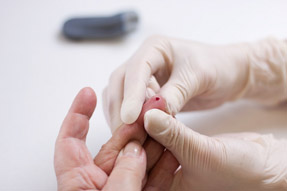October 2014

Targeting glycemic control in the elderly
The challenge in diabetes treatment used to be getting patients' blood glucose low enough. But recent evidence has shown that, at least for elderly diabetics, hypoglycemia may be as much or more of a problem as hyperglycemia.
Release of Medicare pay data raises questions
The release of a massive amount of data about how much physicians had received from Medicare in 2012 was a sign of price transparency to some and an unwelcome intrusion to others. The raw data didn't tell the entire tale, critics said.
A doctor seeks ways to encourage earlier palliative care talks
Palliative care doctors are working on introducing the concept of palliative care across disciplines, with a particular focus on primary care. The goal is to introduce it earlier in the process of patient care, and earlier in the educational process of the physicians themselves.
Data drive debate over antivirals, theory vs. practice
Physicians should focus not only on influenza vaccinations but on treating patients who will get the disease whether they have been vaccinated or not.
Joplin hospital rebuilds, better than before
After a tornado in 2011 destroyed St. John's Medical Center in Joplin, Mo., a new facility will open that will focus on a patient-centered experience, from the aesthetics to the wayfinding to storage and security.
New antibiotics may change inpatient skin infection treatment
Physicians have a few new drugs in their armamentarium for skin and soft-tissue infections.
A tasty potential solution to recurrent Clostridium difficile
One hospital sought a way to treat recurrent Clostridium difficile infections in patients unwilling or unable to undergo fecal transplantation.
AMA's immediate past president reflects on medicine's future
Ardis Dee Hoven, MD, FACP, used her year as president of the American Medical Association to bolster the role of primary care physicians across the field of medicine.
Institute of Medicine report falls short on primary care training
Organized medicine reacted with concern to a proposal to restructure graduate medical education that did not take into account the looming shortage in primary care.
Government dysfunction: It's enough to make a grown man cry
A host of issues highlight the dysfunctional approach that federal and state governments have taken toward issues with a direct impact on health care.
Managing diabetes meds more complicated in elderly patients
This issue covers topics including management of diabetes in the elderly, the public release of Medicare payments to physicians, and new approaches to antivirals as flu season begins.
Accurate coding of the Initial Preventive Physical Examination
It is important for internists to understand and plan for the Initial Preventive Physical Examination, a one-time visit for new Medicare beneficiaries.
Practice Tips: Is ‘secure’ texting an oxymoron or a possibility?
Electronic health communication in health care must be secure. Text messaging is not, but it's how many patients want to talk with their doctors. Consider the ramifications of a message that gets misplaced, and then consider other ways of communicating.
New diabetes drug, LABA for COPD, skin antibiotic approved
This update covers approval of a sodium-glucose co-transporter 2 inhibitor for diabetes, a once-daily long-acting beta-adrenergic agonist (LABA) for chronic obstructive pulmonary disease (COPD), and a new intravenous drug for bacterial skin and skin-structure infections.
MKSAP Quiz: Chest pain of 4 months' duration
A 60-year-old man is evaluated for chest pain of 4 months' duration. He describes the pain as sharp, located in the left chest, with no radiation or associated symptoms; it occurs with walking one to two blocks and resolves with rest. Occasionally, the pain improves with continued walking or occurs during the evening hours. He has hypertension. Family history does not include cardiovascular disease in any first-degree relatives. His only medication is amlodipine. Following a physical examination and electrocardiogram, what is the most appropriate diagnostic test to perform next?.
Going viral
ACP Internist's puzzle feature challenges readers to find clues placed horizontally in rows to reveal an answer written vertically.
